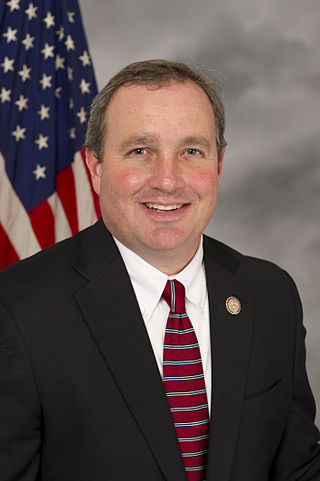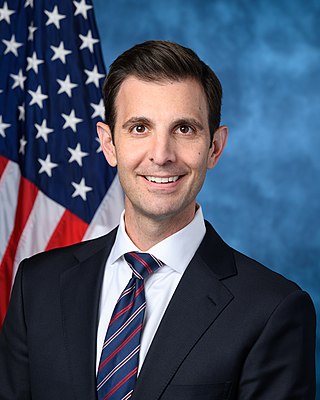
Diana Louise DeGette is an American lawyer and politician serving as the U.S. representative for Colorado's 1st congressional district since 1997. A member of the Democratic Party, her district is based in Denver. DeGette was a Chief Deputy Whip from 2005 to 2019 and is the dean of Colorado's congressional delegation; she served as the Colorado State Representative for the 6th district from 1993 until her election to the U.S. House.
The Border Protection, Anti-terrorism, and Illegal Immigration Control Act of 2005 was a bill in the 109th United States Congress. It was passed by the United States House of Representatives on December 16, 2005, by a vote of 239 to 182, but did not pass the Senate. It was also known as the "Sensenbrenner Bill," for its sponsor in the House of Representatives, Wisconsin Republican Jim Sensenbrenner. The bill was the catalyst for the 2006 U.S. immigration reform protests and was the first piece of legislation passed by a house of Congress in the United States illegal immigration debate. Development and the effect of the bill was featured in "The Senate Speaks", Story 11 in How Democracy Works Now: Twelve Stories a documentary series from filmmaking team Shari Robertson and Michael Camerini.

Scott Eugene DesJarlais is an American politician and physician serving as the U.S. representative for Tennessee's 4th congressional district since 2011. The district stretches across East and Middle Tennessee. He is a member of the Republican Party.

Jeffrey Darren Duncan is a United States representative for South Carolina's 3rd congressional district since 2011. His district comprises nine counties, two of these counties being manufacturing centers for the state. On January 17, 2024, Duncan announced that he would not run for re-election. Duncan previously served in the South Carolina House of Representatives from 2002 to 2010 when he retired to run for the U.S. House of Representatives.
The Democracy Is Strengthened by Casting Light on Spending in Elections Act, or DISCLOSE Act, is a federal campaign finance reform bill that has been introduced in the United States Congress since 2010. The bill would amend the Federal Election Campaign Act of 1971 to provide for greater and faster public disclosure of campaign spending and to combat the use of so-called "dark money" in U.S. elections.

Garland Hale "Andy" Barr IV is an American attorney and politician serving as the U.S. representative for Kentucky's 6th congressional district since 2013. A member of the Republican Party, he previously served in the administration of Kentucky Governor Ernie Fletcher.

The House Baltic Caucus is a bipartisan registered Caucus of the House of Representatives since its inception in 1997 and is composed of members from both the Democratic and Republican Parties. The members of the House Baltic Caucus have a strong interest in promoting opportunities to strengthen the economic, political, and cultural relationships of the United States with Estonia, Latvia, and Lithuania.

The Ensuring Lawful Collection of Hidden Assets to Provide Order Act, abbreviated as the EL CHAPO Act, is a United States Congress bill that would reserve any amount of money seized by the U.S. Government as a result of the criminal prosecution of Joaquín "El Chapo" Guzmán and other felony convictions involving the transportation of controlled substances into the United States for security measures along the U.S.-Mexico border and the construction of a border wall.
The Strengthening the Tenth Amendment Through Entrusting States (STATES) Act was a bill proposed in the 115th United States Congress that would recognize legalization of cannabis and the U.S. state laws that have legalized it through their legislatures or citizen initiative. It was introduced on June 7, 2018, by Senators Cory Gardner and Elizabeth Warren. A companion bill was introduced the same day in the House of Representatives, sponsored by Earl Blumenauer and David Joyce. The act would amend the Controlled Substances Act of 1970 to exempt from federal enforcement individuals or corporations in states who are in compliance with U.S. state, U.S. territory and the District of Columbia, or tribal law on cannabis, with certain additional provisions such as minimum ages. The banking provisions of the STATES Act have been reintroduced as the Secure and Fair Enforcement (SAFE) Banking Act of 2019 in the 116th U.S. Congress by Ed Perlmutter in the House, and by Jeff Merkley in the Senate. As of September 18, 2019, the House bill had 206 cosponsors, and the Senate bill had 33 cosponsors.

The SAFE Banking Act, officially H.R. 1595, full title Secure and Fair Enforcement (SAFE) Act, and also referred to as the SAFE Banking Act of 2019, and as of 2023 the Secure and Fair Enforcement Regulation (SAFER) Banking Act, was proposed legislation regarding disposition of funds gained through the cannabis industry in the United States.

Mary E. Miller is an American politician serving as the U.S. representative for Illinois's 15th congressional district since 2021. She serves on the House Committee on Agriculture and the Committee on Education & Labor. Miller is a member of the Freedom Caucus and has been described as on the far right of the Republican Party.

The Emmett Till Antilynching Act is a United States federal law which defines lynching as a federal hate crime, increasing the maximum penalty to 30 years imprisonment for several hate crime offences.

The New Way Forward Act is a proposed legislation introduced in the U.S. Senate and House on December 10, 2019 by Jesús "Chuy" García, which focuses on immigration reform. The bill would repeal sections 1325 and 1326 of the immigration law to decriminalize unauthorized border crossing whilst maintaining civil deportation procedures. The bill intends to give immigration judges discretion when deciding immigration claims for immigrants with criminal records in the United States, changes immigration enforcement by ending mandatory detention in specific cases and intends to remove private detention centers for immigrants.

The Fairness for High Skilled Immigrants Act or 'Equal Access to Green cards for Legal Employment Act or Immigration Visa Efficiency and Security Act is proposed United States federal legislation that would reform U.S. immigration policy, primarily by removing per-country limitations on employment-based visas, increasing the per-country numerical limitation for family-sponsored immigrants, and for other purposes without increasing the number of visa. In 2020, for the first time it passed by House and Senate; however, the House and Senate versions were different and required reconciliation, and that reconciliation could not be carried out before the expiration of the 116th Congress. In order for the proposed legislation to further progress, it would have to be reintroduced into the 117th Congress and pass the House and Senate again. After the expiration of the 117th congress, the legislation is currently reintroduced into the 118th Congress.

H.R.932 (118th), also known as To repeal the authorizations for use of military force against Iraq, is a bill in the 118th United States Congress that would have repealed the 2002 AUMF. H.R.932 was sponsored on February 9, 2023 by Barbara Lee, the lone vote against the 2001 AUMF. H.R.932 was co-sponsored by 70 Representatives including 27 Republicans. S.316 (118th), also known as A bill to repeal the authorizations for use of military force against Iraq, is the Senate version of H.R.932 that would have repealed the 2002 AUMF. S.316 was sponsored on February 9, 2023 by Virginia Senator Tim Kaine and Indiana Senator Todd Young. S.316 was co-sponsored by 46 Senators including 12 Republicans. S.316 advanced from the Senate by 66 votes to 30 on March 29, 2023. 18 Republican Senators voted in favor of Kaine's proposal while no Democratic Senators voted against it.

The Creating a Respectful and Open World for Natural Hair Act of 2022 was a bill in the United States Congress intended to prohibit discrimination based on an individual's hair texture or hairstyle by classifying such discrimination illegal under federal law. It applied to federally assisted programs, housing programs, public accommodations, and employment. The act was introduced in the House of Representatives by Congresswoman Bonnie Watson Coleman (D-NJ) on March 19, 2021. Senator Cory Booker (D-NJ) introduced a companion bill in the Senate on March 22, 2021. The CROWN Act of 2022 marked the second time the legislation was introduced in Congress.

The Recovering America's Wildlife Act(RAWA) is a bill in the United States Congress intended to provide funding for the conservation of wildlife in the United States.

Christopher Raphael Deluzio is an American attorney, politician and former U.S. Navy officer serving as the U.S. representative for Pennsylvania's 17th congressional district since 2023. The district includes most of the northwestern suburbs of Pittsburgh. He is a member of the Democratic Party.

The Parental Rights Over the Education and Care of Their Kids Act is pending United States legislation introduced in both the House of Representatives and Senate of the 118th congress. Sponsored by Republican representative Tim Walberg and senators Rick Scott of Florida and Tim Scott of South Carolina and originating in the 117th congress, the bill is similar to and viewed of as a national version of the Florida Parental Rights in Education Act, itself known by its opponents as the Don't Say Gay bill.

The Safeguarding Americans from Extremism Actof 2023, or the SAFE Act of 2023, is a proposed bill introduced in the 118th session of the United States Congress. Introduced on November 2, 2023, by Representative Ryan Zinke (R-MT) in response to the 2023 Israel–Hamas war, the legislation would prohibit Palestinians from entering the United States, and revoke visas, refugee status, or asylum granted to Palestinians on or after October 1.








